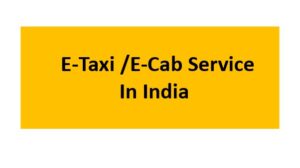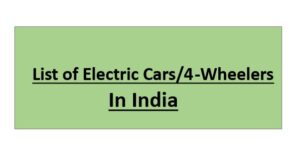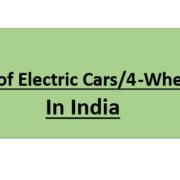Electric Taxi / Electric Cab Service in India

Electric vehicles are not only good for environment as they don’t produce Green House Gases (carbon particles) but are generating lot of business opportunities in automobile market.
These business opportunities include manufacturing of electric vehicles, importing/trading of electric vehicles, manufacturing of charging stations, setting up of Public charging stations, manufacturing of Lithium-ion batteries, charging of Lithium -ion batteries etc.
Apart from above opportunities, one more area is there which is helping EV drive in India & that is – usage of electric vehicles as a taxi or cab service. Details of some companies are given below which are aggressively working in this direction specially in metro cities. These companies provide electric vehicles for taxi or cab purpose.
Contact details – hello@blu-smart.com, 8287000500
Blu-Smart is an Indian company which has office in Gurugram. It is founded by Puneet Singh Jaggi, Anmol Singh Jaggi & Punit Kumar Goyal. At present they operate in Gurugram, South & west Delhi area only with around 685 e -vehicles (according to a leading newspaper). Their operation is just like OLA /Uber where a user can book its ride through an APP. Just we need to download APP from Play store which suitable for Android & Apple mobile phones.
These cabs are booked in a given time slots by the company due to limited numbers of e-vehicles & their charging time also. They have their own charging stations in Gurugram & Delhi.
Contact details – info@project-lithium.com, https://project-lithium.com
Address: 158, 1st Floor, Seetharampalya Village, Mahadevpuram, Banglore, 560048
Phone- 080-48519866
Lithium Technologies is an Indian company based out of Bengaluru. It is founded by Sanjay Krishnan. At present they have around 1100 e vehicles which are running on roads in 9 cities of India starting from Bengaluru, Hyderabad, Pune, Delhi, Noida, Gurugram & Jaipur. Lithium technology run their cab service mainly for pick-up drop for corporate employees because of fixed time of movement of employees from office to residence & vice versa. This is due to range limitation of vehicles & lack of charging infrastructure.
Lithium has their own set of charging stations at various locations to run cab business.
-
Evera Cabs & Charging Stations by Prakriti e-mobility Private Limited –
Address – 1226, 12th Floor, DLF Tower B, Jasola, New Delhi, Delhi-110025
Ph: 011- 49540005/06
Email: info@epratriti.com
Prakriti e-mobality provides Evera Cab which is an Indian company, founded by Mr Namish, Mr Vikas & Mr Rajiv . This e-cab/e-taxi service available in Delhi, Gurugram & Noida. It is an App based e-cab/taxi service. User can book its ride through the App. They provide services
- For individual ride &
- Corporates for pick-up & drop of employees. They have approx. more than 500 e-vehicles which commute in Delhi-NCR. They have their own charging stations to run the e-taxi service.
-
Eee-taxi by A to Z Universal Solutions Pvt Ltd.
Address: Plot Dhani Ram Piayo, Main Palam Vihar Road, Old Delhi Gurgaon Rd, Gurugram, Haryana 122001
Head Office – 6th Floor, Unit No- 601-602, Vipul Square, Shushant Lok-1, Gurugram-Haryana
This is Indian company & headed by Mr Nishant Saini, Vipul Nanda & Shivkanth Khajuria. They provide E-taxi service in Delhi, Gurugram, Noida, Hyderabad & Bengaluru for various purposes like –
- Daily commute which can be booked through an App,
- Business Travel which includes point to point unlimited daily travel,
- After hours travel which includes weekdays, weekends, holidays or late night.
At present they have more than 150 e-vehicles in their service.
-
Cab – Eez Infra Tech Pvt Ltd.
Address: Ground Floor, 29 Kala Nagar, Bandra East, Mumbai- 400051
contact@cabecars.com, 7208878771
This company is Mumbai based & founded by Mr Kuldip Ghosh, Mr Indraneel Chakravarty & Mr Nitin Sharma. AT present they provide E-taxi service in Mumbai only & provide following services –
- City commute – in which office, school, college, pub, movie, salon etc are covered with 24X7 services.
- Intercity Travel – If user is planning to travel from Mumbai to other city.
- In-city rentals – business meetings, shopping, city ride etc are covered with flat rate.
Address: Bellandur, Outer Ring Road, 216, Sobha Hibiscus Bengaluru east, Karnataka 560103 N.
It’s an App based E taxi service, based out of Bengaluru & started e-taxi services in 2020. At present they provide e-taxi service in Bengaluru only. Envi E-taxi service has been started by Malbork which is an innovative & clean technology company.









